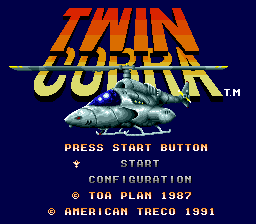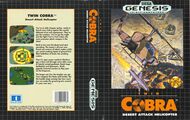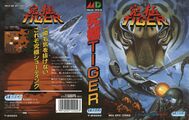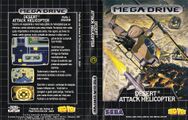Difference between revisions of "Twin Cobra"
From Sega Retro
m (Text replacement - "\| (.*)_source={{num\|([0-9][0-9][0-9][0-9]-[0-9][0-9])\|page=(.*)\|pdf=(.*)\|pdfpage=(.*)}}" to "| $1_source={{magref|$1|$2|$5|printpage=$3}}") |
m (Text replacement - "{{fileref\|GamePro US 0([1-9][0-9])\.pdf\|page=(.*)}}" to "{{magref|gamepro|$1|$2}}") |
||
| Line 13: | Line 13: | ||
| originalsystem=Arcade boards | | originalsystem=Arcade boards | ||
| releases={{releasesMD | | releases={{releasesMD | ||
| − | | md_date_us=1991-06{{fileref|EGM US 023.pdf|page=22}}{{ | + | | md_date_us=1991-06{{fileref|EGM US 023.pdf|page=22}}{{magref|gamepro|23|42}} |
| md_code_us=1128 | | md_code_us=1128 | ||
| md_date_jp=1991-02-22 | | md_date_jp=1991-02-22 | ||
Revision as of 16:17, 9 June 2019
| Twin Cobra | ||||||||||||||||||||
|---|---|---|---|---|---|---|---|---|---|---|---|---|---|---|---|---|---|---|---|---|
| System(s): Sega Mega Drive | ||||||||||||||||||||
| Publisher: Treco (US Sega though Treco is credited) | ||||||||||||||||||||
| Developer: Toaplan with GRC doing sound | ||||||||||||||||||||
| Original system(s): Arcade boards | ||||||||||||||||||||
| Developer(s) of original games: Toaplan | ||||||||||||||||||||
| Genre: Shoot-'em-Up | ||||||||||||||||||||
| Number of players: 1 | ||||||||||||||||||||
|
This short article is in need of work. You can help Sega Retro by adding to it.
Twin Cobra, known as Kyuukyoku Tiger (究極タイガー) in Japan, is a 1987 arcade shoot-'em-up by Toaplan ported to the Sega Mega Drive in 1991 and released in Japan, the US and Brazil.
Contents
Gameplay
The game auto scrolls like most shoot'em ups, A boss awaits at the end of each stage. The game loops after clearing it.
![]() shoots.
shoots. ![]() and
and ![]() drop bombs (which is available in a limited supply). These have very big radius and power, furthermore absorb all bullets while the explosion lasts, but also have a (intentional) delay. Autofire cab be turned on or off. Using an autofire controller can give higher firing rates than the game's internal autofire.
drop bombs (which is available in a limited supply). These have very big radius and power, furthermore absorb all bullets while the explosion lasts, but also have a (intentional) delay. Autofire cab be turned on or off. Using an autofire controller can give higher firing rates than the game's internal autofire.
Powerups are collected in the usual manner but are scarce as only green helicopters drop them. Compared to other game's power up carriers, these are exceptionally well armored. It's worth mentioning that weapons and weapon power ups are different items.
Weapons
- Red: Standard straight shot, widening the more you power up
- Green: narrow, strong laser
- Blue: Spread shot
- Yellow: forward and sideway shot, becomes cross shaped when powered up
History
Legacy
The game was also ported to several others systems of different generations like the NES; FM-Towns and PlayStation as part as Toaplan Shooting Battle Vol.1, the latter being the most faithful port.
In 1995 it received a sequel, Twin Cobra II/Kyuukyoku Tiger II, which would be ported exclusively to the Sega Saturn and released in Japan as Kyuukyoku Tiger II Plus.
A boss in Namco's shoot'em up Dangerous Seed is called "Ultimate Tiger", which is a direct translation of Twin Cobra's name. This could be a deliberate reference.
Versions
By default the Mega Drive port of Twin Cobra is harder than its arcade counterpart, but this difficulty it can be adjusted in the options menu. Its overall presentation (complete with the "insert coin screen"), gameplay, levels layout and enemy patterns are faithful to the arcade original, unlike a rival PC Engine version which stripped its gameplay down and offers simplified presentation and stage design.
The Mega Drive Twin Cobra has a very simplistic way of handling colour, choosing a 64 colour palette at the start of the game and sticking with it regardless of what is happening on screen. This leads to some curious design choices, such as the tanks in stage 1 being bright yellow, as their palette is shared with explosions. On top of this, 16 of those colours are reserved for hit confirmation effects (yellow/red flashing when hitting an enemy), giving even less choice for stages and objects.
The helicopter in all home versions of the game is grey as opposed to the original red colour scheme. There is also some noticable load times before boss fights
Localised names
| Language | Localised Name | English Translation |
|---|---|---|
| English (US) | Twin Cobra | Twin Cobra |
| Japanese | 究極タイガー | Kyuukyoku Tiger |
| Portuguese (Brazil) | Desert Attack Helicopter | Desert Attack Helicopter |
This Mega Drive variant of the game is slightly misleading. The name "Twin Cobra" (or Twin Cobra: Desert Attack Helicopter as listed on the packaging) originates from the localised arcade name for Kyuukyoku Tiger, but the "twin" implies "two", when it is in fact only a one-player game. In Japan, the arcade Kyuukyoku Tiger was originally released in a single-player only-form - a product which did not make it to the US, but is what this Mega Drive port is derived from.
In Brazil this was partially rectified by simply calling the game Desert Attack Helicopter on its packaging, though it uses the Twin Cobra name in-game.
Production credits
Kyuukyoku Tiger
- Publisher: Hajime Satomi
- Producer: Hiromitsu Kususe
- Assistant Producer: Tatsuhiko Tsuchida, Takashi Ohga, Midori Sawada, Takashi Kuroda, Akihiro Murayama
- Program Designer: Hyakumangoku Hamada, Oshiete Kawacyan
- Art Creator: Numataroh, Etoh Shiwasu, Kencyan Arumon Mark-2, Harada Riku-Shicyoh, Arumon Puls, Hashiuri Yuki, Kidokoro Mai
- Music Arranger: Raika no Papa
- Super Data Maker: Dotsukanpo Itoh
- Executive Director: Yoshiaki Sawada
- Special Thanks: Damenanoyo-N Shigecyan, Silpheed, Silence Takahashi, Dadida Syohji, Tetorisu Kudasai Maccyan, Bakkin Tamayama, Yukimi Papa, Urakureani Man 7, Egawa Bucyoh, Yamanaka San, Hex Dec Bin Imoto
- Presented by: Treco
- © 1991 All Rights Reserved
Twin Cobra
- Publisher: Hajime Satomi
- Producer: Hiromitsu Kususe
- Assistant Producer: Tatsuhiko Tsuchida, Takashi Ohga, Midori Sawada, Takashi Kuroda, Akihiro Murayama
- Program Designer: Hyakumangoku Hamada, Oshiete Kawacyan
- Art Creator: Numataroh, Etoh Shiwasu, Kencyan Arumon Mark-2, Harada Riku-Shicyoh, Arumon Puls, Hashiuri Yuki, Kidokoro Mai
- Music Arranger: Raika no Papa
- Super Data Maker: Dotsukanpo Itoh
- Executive Director: Yoshiaki Sawada
- Special Thanks: Damenanoyo-N Shigecyan, Silpheed, Silence Takahashi, Dadida Syohji, Tetorisu Kudasai Maccyan, Bakkin Tamayama, Yukimi Papa, Urakureani Man 7, Egawa Bucyoh, Yamanaka San, Hex Dec Bin Imoto
- Presented by: Sega Enterprises Ltd.
- © 1991 All Rights Reserved
Magazine articles
- Main article: Twin Cobra/Magazine articles.
Promotional material
also published in:
- Beep! MegaDrive (JP) #1991-01: "January 1991" (1990-12-08)[3]
- Beep! MegaDrive (JP) #1991-02: "February 1991" (1991-01-08)[4]
- Mega Drive Fan (JP) #12: "January 1991" (1990-12-08)[5]
- Mega Drive Fan (JP) #13: "February 1991" (1991-01-08)[6]
also published in:
- Mega Drive Fan (JP) #14: "March 1991" (1991-02-08)[7]
Physical scans
| 65 | |
|---|---|
| Based on 31 reviews | |
References
- ↑ 1.0 1.1 File:EGM US 023.pdf, page 22 Cite error: Invalid
<ref>tag; name ":File:EGM US 023.pdf_p22" defined multiple times with different content - ↑ GamePro, "June 1991" (US; 1991-xx-xx), page 42
- ↑ Beep! MegaDrive, "January 1991" (JP; 1990-12-08), page 16
- ↑ Beep! MegaDrive, "February 1991" (JP; 1991-01-08), page 16
- ↑ Mega Drive Fan, "January 1991" (JP; 1990-12-08), page 38
- ↑ Mega Drive Fan, "February 1991" (JP; 1991-01-08), page 42
- ↑ Mega Drive Fan, "March 1991" (JP; 1991-02-08), page 105
- ↑ Beep! MegaDrive, "March 1991" (JP; 1991-02-08), page 34 (36)
- ↑ File:SSM_JP_19950901_1995-09.pdf, page 87
- ↑ The Complete Guide to Sega, "" (UK; 1991-05-xx), page 38/39 (38)
- ↑ 11.0 11.1 Computer & Video Games, "May 1991" (UK; 1991-04-14), page 76
- ↑ 12.0 12.1 MegaTech, "Xmas 1991" (UK; 1991-12-06), page 81
- ↑ 13.0 13.1 Sega Pro, "April 1992" (UK; 1992-03-19), page 31
- ↑ Sega Force, "August 1992" (UK; 1992-07-09), page 90/91 (90)
- ↑ 1700 igr dlya Sega, "" (RU; 2001-xx-xx), page 322
- ↑ 1700 igr dlya Sega, "" (RU; 2001-xx-xx), page 252
- ↑ Aktueller Software Markt, "Mai 1991" (DE; 1991-04-26), page 128
- ↑ Beep! MegaDrive, "March 1991" (JP; 1991-02-08), page 34
- ↑ The Complete Guide to Sega, "" (UK; 1991-05-xx), page 38
- ↑ Console XS, "June/July 1992" (UK; 1992-04-23), page 136
- ↑ Entsiklopediya luchshikh igr Sega. Vypusk 1, "" (RU; 1999-xx-xx), page 365
- ↑ Mean Machines: The Essential Sega Guide, "" (UK; 1993-11-18), page 113
- ↑ Famitsu, "" (JP; 1991-0x-xx), page 1
- ↑ Hippon Super, "March 1991" (JP; 1991-02-04), page 42
- ↑ Joystick, "Avril 1991" (FR; 1991-0x-xx), page 127
- ↑ 26.0 26.1 Sega Mega Drive Advanced Gaming, "January 1993" (UK; 199x-xx-xx), page 95
- ↑ Mega Drive Fan, "May 1991" (JP; 1991-04-08), page 95
- ↑ Mega Play, "May/June 1991" (US; 1991-0x-xx), page 43
- ↑ Mean Machines Sega, "October 1992" (UK; 1992-09-xx), page 142
- ↑ Power Play, "5/91" (DE; 1991-04-12), page 139
- ↑ 31.0 31.1 Sega Power, "October 1991" (UK; 1991-09-05), page 55
- ↑ 32.0 32.1 Sega Pro, "April 1993" (UK; 1993-03-11), page 68
- ↑ Sega Force, "August 1992" (UK; 1992-07-09), page 90
- ↑ Sega Saturn Magazine, "September 1995" (JP; 1995-08-08), page 87
- ↑ Tilt, "Juin 1991" (FR; 1991-0x-xx), page 75
- ↑ Tricks 16 bit, "Tricks Sega Gold 800 igr" (RU; 1998-03-20), page 208
- ↑ Tricks 16 bit, "Tricks Sega Gold 800 igr" (RU; 1998-03-20), page 27
- ↑ Video Games, "2/91" (DE; 1991-06-07), page 91
NEC Retro has more information related to Kyuukyoku Tiger
|
- Pages with reference errors
- 1 player games
- JP Mega Drive games
- All JP games
- US Mega Drive games
- All US games
- BR Mega Drive games
- All BR games
- Mega Drive games
- 1991 Mega Drive games
- All 1991 games
- Mega Drive shoot-'em-up games
- All shoot-'em-up games
- Use romtable template
- All games
- Stubs
- Bad translation
- Credits without reference
- GalleryPrintAd file defined
- Old-style rating (bemega)
- Old-style rating (bemega r)
- Use magref
- Old-style rating (cgts)
- Old-style rating (cvg)
- Old-style rating (famitsu)
- External rating reference
- Old-style rating (hippons)
- Rating without PDF source
- Old-style rating (joystick)
- Old-style rating (mdag)
- Old-style rating (megatech)
- Old-style rating (segapower)
- Old-style rating (segapro)
- Old-style rating (sfuk)
- Update ratings template
- 19 old ratings






